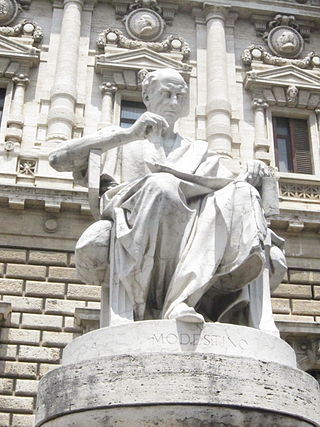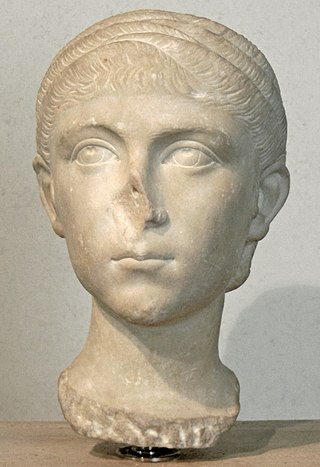
Lucius Septimius Severus was a Roman politician who served as emperor from 193 to 211. He was born in Leptis Magna in the Roman province of Africa. As a young man he advanced through the customary succession of offices under the reigns of Marcus Aurelius and Commodus. Severus was the final contender to seize power after the death of the emperor Pertinax in 193 during the Year of the Five Emperors.

The Severan dynasty, sometimes called the Septimian dynasty, was an Ancient Roman imperial dynasty that ruled the Roman Empire between 193 and 235, during the Roman imperial period. The dynasty was founded by the emperor Septimius Severus, who rose to power after the Year of the Five Emperors as the victor of the civil war of 193–197, and his wife, Julia Domna. After the short reigns and assassinations of their two sons, Caracalla and Geta, who succeeded their father in the government of the empire, Julia Domna's relatives themselves assumed power by raising Elagabalus and then Severus Alexander to the imperial office.
The 200s decade ran from January 1, 200, to December 31, 209.
The 210s decade ran from January 1, 210, to December 31, 219.
Year 212 (CCXII) was a leap year starting on Wednesday of the Julian calendar. At the time, it was known as the Year of the Consulship of Asper and Camilius. The denomination 212 for this year has been used since the early medieval period, when the Anno Domini calendar era became the prevalent method in Europe for naming years.

Marcus Aurelius Antoninus, better known by his nickname Caracalla, was Roman emperor from 198 to 217 AD. He was a member of the Severan dynasty, the elder son of Emperor Septimius Severus and Empress Julia Domna. Severus proclaimed Caracalla co-ruler in 198, doing the same with his other son Geta in 209. The two brothers briefly shared power after their father's death in 211, but Caracalla soon had Geta murdered by the Praetorian Guard and became sole ruler of the Roman Empire. Julia Domna had a significant share in governance, since Caracalla found administration to be mundane. His reign featured domestic instability and external invasions by the Germanic peoples.

Ulpian was a Roman jurist born in Tyre in Roman Syria. He moved to Rome and rose to become considered one of the great legal authorities of his time. He was one of the five jurists upon whom decisions were to be based according to the Law of Citations of Valentinian III, and supplied the Justinian Digest about a third of its contents.

Publius Septimius Geta was Roman emperor with his father Septimius Severus and older brother Caracalla from 209 to 211. Severus died in February 211 and intended for his sons to rule together, but they proved incapable of sharing power, culminating with the murder of Geta in December of that year.

Herennius Modestinus, or simply Modestinus, was a civil servant and a celebrated Roman jurist, a student of Ulpian who flourished about 250 AD.

Julia Domna was Roman empress from 193 to 211 as the wife of Emperor Septimius Severus. She was the first empress of the Severan dynasty. Domna was born in Emesa in Roman Syria to an Arab family of priests of the deity Elagabalus. In 187, she married Severus, who at the time was governor of the Roman province of Gallia Lugdunensis. They had two sons, Caracalla and Geta. A civil war over the Roman throne broke out in 193, and shortly afterwards Severus declared himself emperor. The war ended in 197 with the defeat of the last of Severus's opponents.
Lucius Fabius Cilo, full name Lucius Fabius Cilo Septiminus Catinius Acilianus Lepidus Fulcinianus, was a Roman senator, who was a confidant of Septimius Severus. He held a number of appointments that have been dated to the reigns of Commodus and Severus. He was twice Roman consul: the first time in 193 as a suffect, and the second time as ordinary consul in 204 with Marcus Annius Flavius Libo as his colleague. Cilo is known from numerous inscriptions and appears in the Historia Augusta and the history of Dio Cassius. He married Cilonia Fabia.

Gaius or Lucius Fulvius Plautianus was a member of the Roman gens Fulvia. As head of the Praetorian Guard, he was very influential in the administration of state affairs, and clashed with Julia Domna, the wife of Septimius Severus.
Julius Paulus, often simply referred to as Paul in English, was one of the most influential and distinguished Roman jurists. He was also a praetorian prefect under the Roman Emperor Alexander Severus.
Callistratus, a Roman jurist, who, as appears from passages in Justinian's Digest, wrote at least as late as the reign of Septimius Severus and Caracalla.

Publia Fulvia Plautilla was the wife of the Roman emperor Caracalla, her paternal second cousin. After her father was condemned for treason, she was exiled and eventually killed, possibly on Caracalla's orders.
Gaius Julius Avitus Alexianus was a Roman nobleman of Syria who had an impressive military and political career.
Aelius Marcianus was a Roman jurist who wrote after the death of Septimius Severus, whom he calls Divus in his excerpts from the Pandects. Other passages in the same source show that he was then writing under Antoninus Caracalla, the son and successor of Severus. It also appears from his Institutiones that he survived Caracalla. It is therefore probable that he also wrote under Alexander Severus, whose reign commenced 222 AD. Caracalla died in 217. Another Aelius Marcianus is cited in the Pandects, who was proconsul of Hispania Baetica in the time of Antoninus Pius.
Publius Septimius Geta was the father of the emperor Lucius Septimius Severus, father-in-law of the Roman empress Julia Domna and the paternal grandfather of the Roman emperors Caracalla and Geta. Besides mentions in the Historia Augusta, Geta is known from several inscriptions, two of which were found in Leptis Magna, Africa.
The gens Septimia was a minor plebeian family at ancient Rome. The gens first appears in history towards the close of the Republic, and they did not achieve much importance until the latter half of the second century, when Lucius Septimius Severus obtained the imperial dignity.

This article lists historical events that occurred between 201–300 in modern-day Lebanon or regarding its people.











